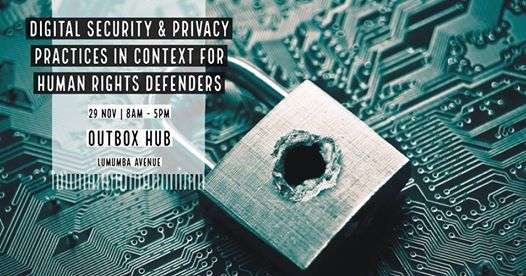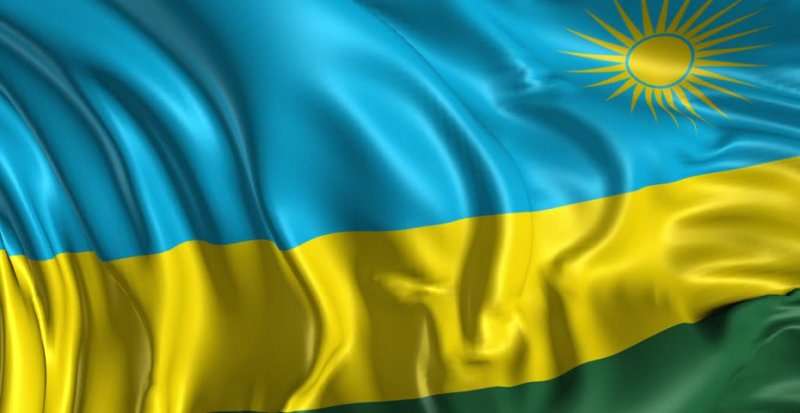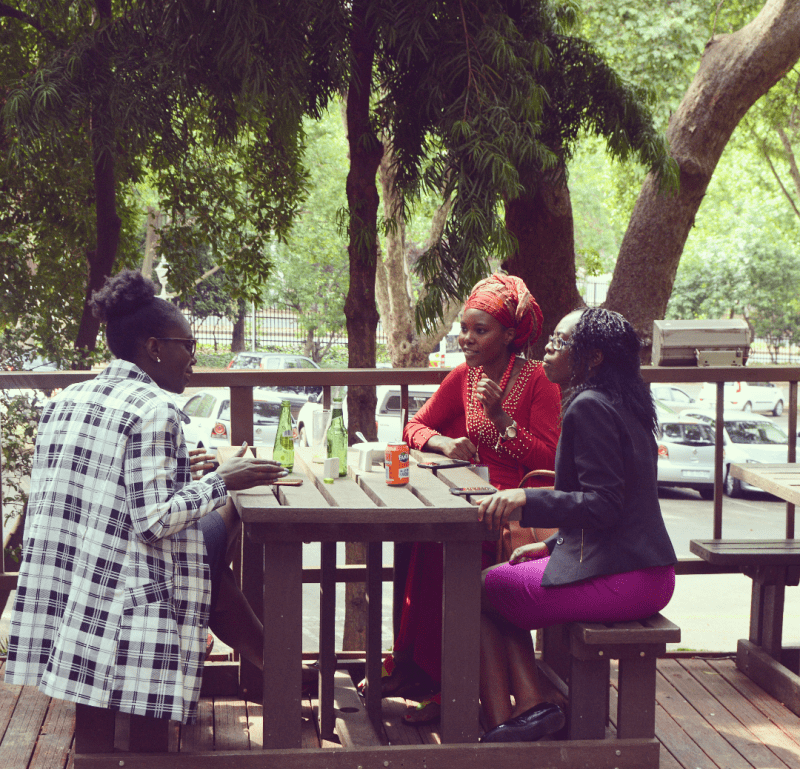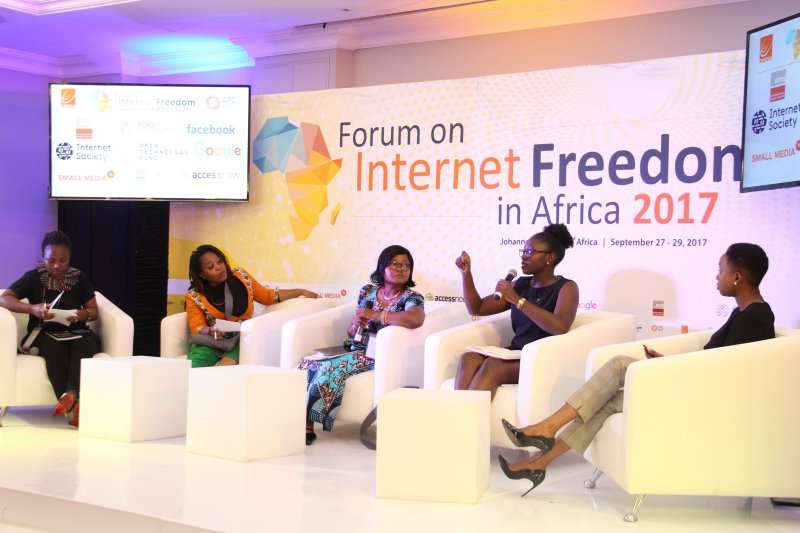Workshop |
The Collaboration on International ICT Policy for Eastern and Southern Africa (CIPESA) in partnership with Outbox, a Kampala based tech hub are hosting a workshop aimed at building digital rights knowledge as well as the digital security and capacity of human rights defenders, media, vulnerable women organisations in Uganda.
Despite the importance of digital security and privacy for human rights defenders in carrying out their work, the development of effective digital security strategies still present a numerous challenge. Human rights defenders have to contend with an ever shifting landscape of technologies and threats, limited understanding of behavioral factors and the lack of customisation for a number of the tools, among others.
The one day workshop will be hosted at Outbox on the November 29, 2017 and is aimed at targeting human rights defenders, software developers, media and other civil society actors. Use this link to register.
Rapport alternatif sur la liberté d'expression en ligne au Rwanda
La “Collaboration on International ICT Policy for East and Southern Africa” (CIPESA) a soumis à la Commission Africaine des Droits de l’homme et des Peuples (CADHP) un rapport parallèle sur l’état de la liberté d’expression en ligne au Rwanda.
Le rapport décrit les mesures législatives et connexes prises par le Rwanda pour promouvoir et protéger la liberté d’expression en ligne et fournit à la Commission des informations impartiales sur l’état de la liberté d’Internet au Rwanda, ainsi que des recommandations d’amélioration.
L’article 62 de la Charte Africaine des Droits de l’Homme et des peuples (La Charte Africaine) exige que tous les Etats parties à la Charte présentent tous les deux ans des rapports sur les mesures prises pour réaliser les droits et libertés garantis par la Charte. Le Rwanda a soumis des rapports pour la période de 2009 à 2016 en date du 22 mars 2017. Ils ont été examinés par la commission cette semaine, avec des groupes de la société civile tels que CIPESA fournissant des rapports alternatifs et des questions pour informer la commission.
Dans son rapport, le gouvernement rwandais a déclaré que la liberté des médias et la liberté d’information sont reconnues et prévues par la loi, ajoutant que tout journaliste a droit à la liberté d’opinion et d’expression, y compris le droit de rechercher, recevoir, et diffuser des informations et des idées à travers tous les médias. Cependant, selon le rapport alternatif du CIPESA, diverses lois et pratiques étatiques continuent de contrevenir à ces libertés, limitant notamment leur jouissance en ligne. La surveillance et l’interception des communications, le blocage et le filtrage du contenu sont parmi les questions problématiques soulevées par le rapport parallèle du CIPESA.
Le gouvernement Rwandais a déclaré que la loi relative à l’accès à l’information est un point d’entrée pour améliorer la participation des journalistes aux affaires politiques et reconnaît l’importance d’une presse indépendante et professionnelle, ainsi que celle d’un accès facile à l’information comme composantes essentielles de la bonne gouvernance, du développement économique et politique durables. Il a ensuite précisé les lois nationales et les institutions statutaires qui garantissent le droit à l’expression et la liberté d’information.
Cependant, le rapport alternatif note que la loi n ° 24/2016 du 18/06/2016 sur les TIC, la Loi n ° 60/2013 réglementant l’interception des communications, le Code de procédure pénale n ° 30/2013 du 24/05/2013, la loi régissant l’enregistrement de la carte SIM de 2013, contiennent des dispositions qui portent atteinte à la liberté d’expression en ligne et aux droits à la vie privée et contreviennent à l’article 38 de la Constitution, aux normes internationales et aux meilleures pratiques en matière de liberté d’expression et d’accès à l’information.
En juin 2017, le taux de pénétration de l’Internet au Rwanda était estimé à 36,6% (3 724 678 connexions), les utilisateurs de Facebook étant estimés à 490 000, sur une population totale de 12 159 586 personnes. Cela représente une amélioration par rapport aux statistiques enregistrées par le “Rwanda Utilities Regulatory Authority” ( Agence de réglementation des services publics du Rwanda : RURA), qui indiquait un taux de pénétration du téléphone mobile de 79% et une pénétration d’Internet de 33%, en juin 2016.
Le rapport du CIPESA demande une révision complète de toutes les lois et politiques régissant l’interception et la vie privée afin de les mettre en conformité avec les garanties constitutionnelles, les normes internationales des droits de l’homme et les meilleures pratiques en matière de surveillance des communications et de respect de la vie privée.
Pour plus de détails, voir le rapport alternatif complet produit par le CIPESA, sur l’état de la liberté d’expression en ligne au Rwanda.
Shadow Report on Freedom of Expression Online in Rwanda
Submission to the ACHPR |
The Collaboration on International ICT Policy for East and Southern Africa (CIPESA) has submitted to the African Commission on Human and Peoples’ Rights (ACHPR) a shadow report on the state of freedom of expression online in Rwanda.
The report outlines Rwanda’s legislative and related measures taken to promote and protect freedom of expression online, and provides the Commission with impartial information regarding Rwanda’s state of internet freedom and recommendations for improvement.
Article 62 of the African Charter on Human and Peoples’ Rights (the African Charter) requires all States Parties to the charter to submit after every two years, reports on the measures taken to effect the rights and freedoms guaranteed by the charter. Rwanda submitted reports for the period 2009 to 2016 on March 22, 2017. They were reviewed by the commission this week, with civil society groups such as CIPESA providing shadow reports and questions to inform the commission’s review.
In its report, the Rwanda government stated that freedom of the media and the freedom to receive information are recognised and provided for by law, adding that every journalist has the right to freedom of opinion and expression, including the right to seek, receive, give and broadcast information and ideas through any media. However, according to CIPESA’s shadow report, various laws and state practices continue to contravene these freedoms, notably constraining their enjoyment online. Surveillance and interception of communications, blockage and filtering of content, are among the problematic issues CIPESA’s shadow report raises
The Rwanda government stated that the access to information law is an entry point to improving journalists’ participation in political affairs and that it recognises the importance of an independent, professional media and ease of access to information as essential components of good governance and a sustainable social, economic and political development. It went on to specify national laws and statutory institutions that safeguard the right to expression and freedom of information.
However, the shadow report notes that the ICT law N° 24/2016 of 18/06/2016, Law No.60/2013 regulating the Interception of Communications, Criminal Procedure Code Law N° 30/2013 of 24/05/2013, and the regulation of SIM card registration of 2013 collectively contain some provisions that undermine freedom of expression online and privacy rights and contravene article 38 of Rwanda’s Constitution, international standards and best practices on freedom of expression, access to information and privacy rights.
As of June 2017, Rwanda’s internet penetration was estimated at 36.6 % (3,724,678 connections) with Facebook users estimated at 490,000, within a total population of 12,159,586. This shows an improvement from statistics recorded by the Rwanda Utilities Regulatory Agency (RURA) indicating mobile phone penetration rate of 79% and internet penetration at 33%, as of June 2016.
CIPESA’s report calls for a comprehensive review of all interception and privacy laws and policies to bring them into conformity with constitutional guarantees as well as international human rights standards and best practices on surveillance of communications by setting out clear legal parameters that ensure protection of freedom of expression and privacy rights.
For more details, see the full Shadow Report on Freedom Expression Online in Rwanda submitted by CIPESA.
Using FIFAfrica17 Conversations To Drive Change
By Martha Chilongoshi |
The Africa I want is one that embraces diversity, promotes freedom of expression, values the right to information and prioritizes the elimination of all forms of discrimination on the basis of gender.
For my ideal Africa to be realized, actions, initiatives and conversations that challenge the status quo and disrupt structural systems which hinder development are very vital and this is what the Forum on Internet Freedom represents for me, an opportunity to meet like-minded people and share ideas as well as experiences on how to advance our societies for the better.
A communication for development professional like me finds great value in the Forum on Internet Freedom gatherings because it presents diverse opportunities for me to learn about the social, economic and political factors affecting internet access and usage in other countries in Africa and how I can apply lessons from there to address and solve prevailing issues in my own country – Zambia.
More importantly, the forum has deepened my knowledge on the role of the internet in the development agenda in that, I have been afforded the opportunity to meet my online community in an offline setting and build a support structure that offers solutions and coping strategies to challenges of internet shutdowns, restrictions on freedom of expression, women’s safety online, privacy and security among other things.
As a gender equality & human rights activist, I particularly enjoyed the session on “Finding equality in an age of discrimination online” with panelists, Emilar Gandhi (Facebook), Daniel Kigonya, (iFreedom Uganda), Caroline Tagny (CAL) and Fungai Machirori (APC). This was an important conversation for me because personally, I have committed to use my skills as a Journalist to create awareness and give prominence to issues that affect women and girls using social media and blogging platforms and in my experience, online spaces have not been spared from the patriarchal structures and attitudes that exist offline
Patriarchy has been defined in the Merriam Webster dictionary as;
– a social organization marked by the supremacy of the father in the clan of the family
– the legal dependence of wives and children, and the reckoning of descent and inheritance in the male line
– control by men of a disproportionately large share of power
With this in mind, it is not surprising that online spaces are being used to perpetuate the very inequalities that exist offline and policing how women and girls express themselves online, how they report violations and how they narrate their experiences. This is why the conversation on “Women’s safety online” by panellists, Francoise Mukuku (Si Jeunesse Savait DR Congo), Irene Kiwia (Tanzania Women of Achievement), Emilar Ghandi (Facebook) and Twasiima Patricia (Chapter Four Uganda) was also very key because it addressed the need to ensure women and girls are protected online and users of the Internet adhere to the set community standards and ideals that deter them from perpetuating abuse and discrimination.
I must add that apart from the panel discussions, I really enjoyed the personal conversations I had during tea and lunch breaks, one of my favourite discussions on the sidelines of the Forum was a conversation about feminism and gender equality with Tricia from Uganda and Tracey from Kenya. As the image below will show, we were so invested in the conversation and it was a brilliant, rich and empowering exchange of young women daring to stand up against structures and environments that perpetuate discrimination using online spaces.
 Another key take away from these two sessions was the need to empower women and girls with information about their rights through access to the internet so they can recognise when those rights are being threatened or violated by another person. Often, women and girls are socialised and conditioned to think that they cannot make decisions without the approval of their male relations because from time in memorial, the power lies with men and women are constantly subjected to finding ways of not upsetting this hold on power and in effect remaining silent in the face of violence.
Another key take away from these two sessions was the need to empower women and girls with information about their rights through access to the internet so they can recognise when those rights are being threatened or violated by another person. Often, women and girls are socialised and conditioned to think that they cannot make decisions without the approval of their male relations because from time in memorial, the power lies with men and women are constantly subjected to finding ways of not upsetting this hold on power and in effect remaining silent in the face of violence.
There are many progressive developments that online spaces have provided to ordinary people in terms of dealing with equality, freedom of expression and access to information. More people are now able to voice out on issues that affect them in real time and create a critical mass through social movements that have proved to be a force in challenging the powers that be. This has easily been evidenced by internet shutdowns by governments in Zimbabwe, Cameroon, Togo and Gambia among other countries.
This brings me to another conversation I found most intriguing at the forum themed “Privacy & Freedom of Expression” which was wonderfully moderated by Gbenga Sesan of Paradigm Initiative and featured panellists from state institutions namely James Mutandwa Madya (Ministry of ICT Postal and Courier Services Zimbabwe), Micheal Ilishebo (Zambia Police Service), Marian Shinn (MP, Parliament of South Africa) and Fortune Mgwili-Sibanda (Google).
For the last two years, my line of work has involved working on projects that are centred on democracy, good governance and civic participation especially during electoral processes and this particular conversation was key in understanding how state institutions view the internet and its power to connect people for social change. The conversation between the panellists and audience brought one thing to light, many African governments are threatened by the power that the internet gives to ordinary citizens and as a result, opt to shut it down in order to repress social movements that mobilise people towards an issue.
This can be proved by revisiting how the Zimbabwean government dealt with Evan Mawarire, a pastor whose social media movement dubbed #ThisFlag inspired thousands of Zimbabweans online and offline to demand for better conditions of living from their government. He had to flee his country because his family was no longer safe and when he eventually returned, he was immediately arrested and charged with “attempting to overthrow a constitutionally elected government”.
Another prominent case was that of Cameroon where the Internet was shut down for 3 months in the English speaking region of the country by the government. The shutdown caused hundreds of citizens to mobilise and find alternative means of accessing the internet and creating the hashtag #BringBackOurInternet to let the world know of the discrimination and suppression that was happening in Cameroon. Among the prominent Cameroonian voices that demanded for the restoration of the internet was the Forum’s keynote speaker, Rebecca Enonchong, Founder and CEO of Apps Tech who shared her experience on the impact of the internet shutdown on the rights and freedoms of Cameroonians and to a great extent, its impact on the economy.
If I have to sum up my experience at the forum on internet freedom 2017, I will say that it has given me a fresh and dynamic perspective of the internet, it has broadened my knowledge on the many ways I can use the internet as a tool and an enabler for my human rights activism and encourage civic participation in my community. It has also allowed me to see the economic impact that an internet shutdown can have on a country and for me, this is a great angle from which to advocate for an open, neutral and free internet. I can’t wait for next year’s conversation!

Originally published on the Revolt For Her website
Internet shutdowns take centre stage at #InternetFreedomAfrica forum
By Shitemi Khamadi |
When figures are put forth, bringing the arguments of something to the table, the conversation changes. One starts to look at the loss accrued from their actions or inactions and make an informed decision. In the same vein, when people come together to fight for a course, a just course, the likelihood of succeeding is higher.
This was the case at the Forum on Internet Freedom in Africa 2017 where the Collaboration on International ICT Policy for East and Southern Africa (CIPESA) launched a report affirming that over a period of 236 days, internet disruptions in 10 African countries led to loss of US$237 million. That is a colossal amount, equivalent to some budgets of key infrastructure projects on the continent.
Meanwhile, the 2017 State of the Internet Freedom in Africa Report themed; Intermediaries’ Role in Advancing Freedom: Challenges and Prospect also highlighted the critical role of telecommunications companies in government-initiated shutdowns and censorship.
 In a panel on privacy and freedom of expression, a representative from Zimbabwe’s Ministry of ICT, Postal and Courier Services asserted that the country will not shutdown the internet. Neither will they disrupt social media. The official stated that the negative effects of shutdowns initiated in other countries were clear and limiting access to the internet stifles expression, causes more harm than good. For an otherwise autocratic regime, this is telling of its appreciation of the impact technology has on the lives of citizens; social-economic and political.
In a panel on privacy and freedom of expression, a representative from Zimbabwe’s Ministry of ICT, Postal and Courier Services asserted that the country will not shutdown the internet. Neither will they disrupt social media. The official stated that the negative effects of shutdowns initiated in other countries were clear and limiting access to the internet stifles expression, causes more harm than good. For an otherwise autocratic regime, this is telling of its appreciation of the impact technology has on the lives of citizens; social-economic and political.
Equally important to the debate about quantifying the cost and impact of shutdowns was the session titled ‘Unmasking the real impact of internet shutdowns in Africa’. The panellists included Fiona Asonga from Tespok, a Kenyan organization that brings together telecom operators but also software & hardware developers & ICT hubs.
Asonga shared on policy advocacy efforts to push back against the Cameroonian government’s shut down of the internet in the English speaking regions for 93 days. She emphasised that continuous engagement was key to ensuring progressive actions from such governments.
The #KeepItOn session was great for advocacy enthusiasts. Here, coalition experiences of how to fight back against shutdowns were shared including joint condemnation letters to authorities and social media campaigns. Perhaps the most piercing is the collecting and dissemination of individual impact stories on the negative effects of shutdowns to lives. Such, go beyond abstract thoughts and conversations to real life scenarios.
Privacy was another recurring theme at the Forum with discussions highlighting the lack of data protection policies in many African countries, which had led to a growing trend of data breaches. For instance in Kenya where data protection is not well regulated, concerns arise as to whether intermediaries care an inch about the tons of private data they have on people. Kenyans receive unsolicited SMSs from politicians and businesses about their products. They can easily blame telcos for sharing their data but between the telco and themselves, lay tens of places like buildings and mobile money outlets where details are disclosed and any unscrupulous individual can mine for personal gain.
What was lacking from these conversations were insights on how African countries can fast track implementation of effective data protection laws. Going by the example of the Access to Information Act in Kenya that took the Private Members’ Bill approach after government stalled, could such an approach be explored towards citizens’ realisation of the right to privacy?
Overall, sessions at the Forums were quite timely, and so were the practical digital security clinics run by Access Now and DefendDefenders to ensure activists are equipped with the necessary skills and knowledge to work safely and securely.
Here is to a toss The Collaboration on International ICT Policy for East and Southern Africa (CIPESA) and the Association for Progressive Communications for a good job done.
The article was originally published on the iFreeKe website




